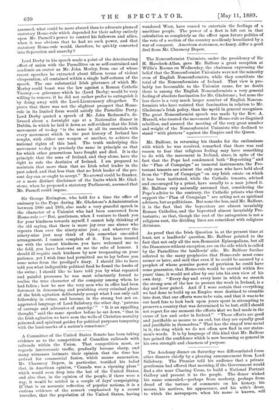Lord Derby in his speech made a point of the
deteriorating effect of union with the Parnellites on so self-restrained and academic an orator as Mr. John Morley, from one of whose recent speeches he extracted about fifteen terms of violent vituperation, all contained within a single half-column of the speech. The one substantial Irish grievance of which Mr. Morley could boast was the law against a Roman Catholic Viceroy,—a grievance which he (Lord Derby) would be very willing to remove, if be did not rather prefer to extinguish it by doing away with the Lord-Lieutenancy altogether. To prove that there was not the slightest prospect that Home. rulein its limited form would satisfy the Parnellite Party, Lord Derby quoted a speech of Mr. John Redmond's, de- livered about a fortnight ago at a Nationalist dinner in Dublin, in which he laid it down as self-evident that the Irish movement of to-day "is the same in all its essentials with every movement which in the past history of Ireland has sought, with either one weapon or another, to achieve the national rights of this land. The truth underlying this movement to-day is precisely the same in principle as that
for which other generations have fought and died. It is the principle that the sons of Ireland, and they alone, have the
right to rule the destinies of Ireland. I am prepared to maintain that more than that no Irish rebel leader in the past asked, and that less than that no Irish leader of the pre- sent day can or ought to accept." No avowal could be franker, or a more distinct disclaimer of the limits which Mr. Glad- stone, when he proposed a statutory Parliament, assumed that Mr. Parnell could impose.






































 Previous page
Previous page